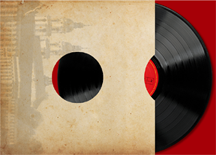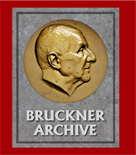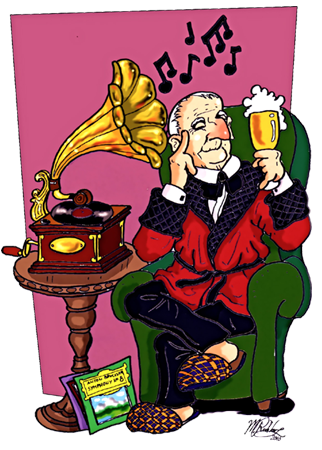Anton Bruckner, the Hunting Horn and Josef Schantl
Carlo Maria von Weber, Gustav Mahler, Felix Mendelssohn, Richard Wagner and certainly Anton Bruckner evoked the hunting horn in their music. In 19th century Austria, hunting horn ensembles were extremely popular and it should come as no surprise that their performances were the subject of some of the earliest sound recordings. One of the best known of these Austrian horn players was Professor Josef Schantl (b. February 8, 1842 in Graz, Styria; d. April 27, 1902 in Amstetten, Lower-Austria). Schantl came from a long line of horn players including his father (Florian Schantl in Graz), his grandfather (Franz Xaver Schantl) his uncle, and two of his brothers. Schantl began his orchestra career with the Johann Strauß "Kapelle" (Orchestra) where he encountered the "Tristan und Isolde" Prelude (1st performed by this Orchestra, after the Vienna Court Opera Orchestra had refused it after too many rehearsals. This happened before the Munich world-premiere of the Opera). Schantl became principal horn-player with the Vienna "Hof-Oper" and the Vienna Philharmonic in October of 1870. He premiered Johannes Brahms 2nd and 3rd Symphonies, Anton Bruckner 3rd and 8th Symphonies, and other important works with the Vienna Philharmonic. Schantl was actively involved with the restoration and renaissance of the hunting-music repertoire. As a result, he received many invitations by princes or other nobles to coach their bands of hunting horn-players. Schantl willing accepted since it often allowed him to join in the subsequent hunts. Count Hans Wilczek asked him to write special fanfares for the different bands and thus Schantl was recognized as the re-creator of the Austrian hunting-music genre.. Schantl wrote the 1st Wagner excerpt books, the 1st excerpt studies for the Wagner-Tuba, and his famous "Great Horn Method" encompassed four volumes. When Richard Wagner conducted in Vienna the preliminary performances of parts of the "Ring Cycle" in 1875, Schantl played the "Long Call" and did so many times until his early retirement. Schantl shared the principal horn position in the orchestra with Emil Wipperich and Christian Novak, Sr. Schantl was not allowed to teach at the Academy because he lacked the required academic credentials. So, Emil Wipperich taught at the Academy and Schantl at the Conservatory. Fortunately, most of his compositions are preserved. As stated above, hunting horn ensembles were often the subject of early phonograph recordings. One of the earliest (prior to 1910) is of the then popular "Im Walde." The recording can be played here. To date, we cannot locate a recording that directly connects Josef Schantl as a performer. Of other early recordings, we have the names of the performers, but no direct connection of them to performances of Bruckner's music. But the musical example gives a good indication of the art of horn playing at the time when Bruckner's music was first being performed. ========= My thanks to colleague, Gilles Houle who spent a good deal of time on the Internet searching for links between the earliest horn player recordings and the performers of Bruckner's music in turn-of-the-century Austria. | ||||||







